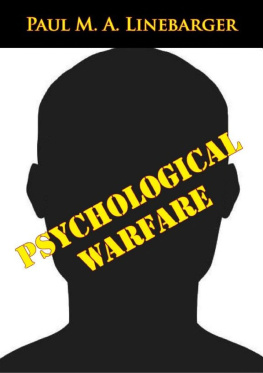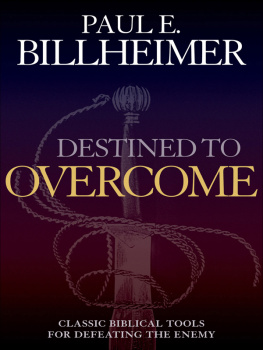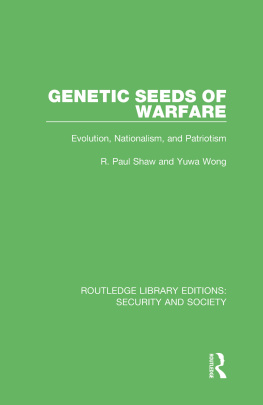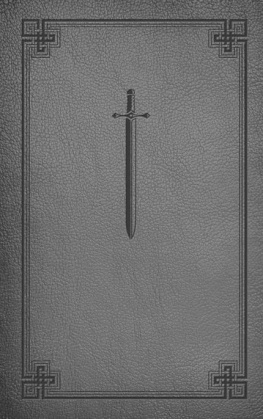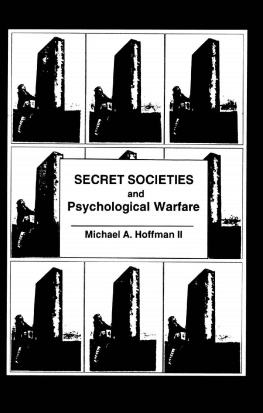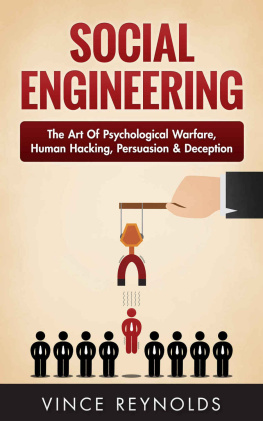Paul M. A. Linebarger - Psychological Warfare
Here you can read online Paul M. A. Linebarger - Psychological Warfare full text of the book (entire story) in english for free. Download pdf and epub, get meaning, cover and reviews about this ebook. year: 0, genre: Politics. Description of the work, (preface) as well as reviews are available. Best literature library LitArk.com created for fans of good reading and offers a wide selection of genres:
Romance novel
Science fiction
Adventure
Detective
Science
History
Home and family
Prose
Art
Politics
Computer
Non-fiction
Religion
Business
Children
Humor
Choose a favorite category and find really read worthwhile books. Enjoy immersion in the world of imagination, feel the emotions of the characters or learn something new for yourself, make an fascinating discovery.
- Book:Psychological Warfare
- Author:
- Genre:
- Year:0
- Rating:5 / 5
- Favourites:Add to favourites
- Your mark:
- 100
- 1
- 2
- 3
- 4
- 5
Psychological Warfare: summary, description and annotation
We offer to read an annotation, description, summary or preface (depends on what the author of the book "Psychological Warfare" wrote himself). If you haven't found the necessary information about the book — write in the comments, we will try to find it.
Psychological Warfare — read online for free the complete book (whole text) full work
Below is the text of the book, divided by pages. System saving the place of the last page read, allows you to conveniently read the book "Psychological Warfare" online for free, without having to search again every time where you left off. Put a bookmark, and you can go to the page where you finished reading at any time.
Font size:
Interval:
Bookmark:
Psychological Warfare
by
Paul M. A. Linebarger
School of Advanced International Studies
TO
D.E.W. AND A.C.W.
TWO FRIENDS FROM THREE WORLDS
This book is the product of experience rather than research, of consultation rather than reading. It is based on my five years of work, both as civilian expert and as Army officer, in American psychological warfare facilitiesat every level from the Joint and Combined Chiefs of Staff planning phase down to the preparing of spot leaflets for the American forces in China. Consequently, I have tried to avoid making this an original book, and have sought to incorporate those concepts and doctrines which found readiest acceptance among the men actually doing the job. The responsibility is therefore mine, but not the credit. Psychological warfare involves exciting wit-sharpening work. It tends to attract quick-minded peoplemen full of ideas. I have talked about psychological warfare with all sorts of people, all the way from Mr. Mao Tse-tung in Yenan and Ambassador Joseph Davies in Washington to an engineer corporal in New Zealand and the latrine-coolie, second class, at our Chungking headquarters. I have seen one New York lawyer' get mentally befuddled and another New York lawyer provide the solution, and have seen Pulitzer Prize winners run out of ideas only to have the stenographers supply them. From all these people I have tried to learn, and have tried to make this book a patchwork of enthusiastic recollection. Fortunately, the material is non-copyright; unfortunately, I cannot attribute most of these comments or inventions to their original proponents. Perhaps this is just as well: some authors might object to being remembered.
A few indebtednesses stand out with such clarity as to make acknowledgment a duty. These I wish to list, with the caution that this list is not inclusive.
First of all, I am indebted to my father, Judge Paul M. W. Linebarger (1871-1939), who during his lifetime initiated me into almost every phase of international political warfare, whether covert or overt, in connection with his life-long activities on behalf of Sun Yat-sen and the Chinese Nationalists. On a limited budget (for years, out of his own pocket) he ran campaigns against imperialism and communism, and for Sino-American friendship and Chinese democracy, in four or five languages at a time. For five and a half years I was his secretary, and believe that this experience has kept me from making this a book of exclusively American doctrine. There is no better way to learn the propaganda job than to be whipped thoroughly by someone elses propaganda. Second only to my debt to my father, my obligation to the War Department General Staff officers detailed to Psychological Warfare stands forth. By sheer good fortune, the United States had an unbroken succession of intelligent, conscientious, able men assigned to this vital post, and it was my own good luck to serve under each of them in turn between 1942 and 1947. They are, in order of assignment: Colonel Percy W. Black, Brigadier General Oscar N. Solbert, Colonel Charles Blakeney, Lieutenant Colonel Charles Alexander Holmes Thomson, Colonel John Stanley, Lieutenant Colonel Richard Hirsch, Lieutenant Colonel Bruce Buttles, Colonel Dana Johnston, Lieutenant Colonel Daniel Tatum, and Lieutenant Colonel Wesley Edwards. Their talents and backgrounds were diverse but their ability was uniformly high. I do not attribute this to the peculiar magic of Psychological Warfare, nor to unwonted prescience on the part of The Adjutant General, but to plain good luck.
Especial thanks are due to the following friends, who have read this manuscript in whole or in part. I have dealt independently with the comments and criticism, so that none of them can be blamed for the final form of the book. These are Dr. Edward K. Merat, the Columbia-trained MIS propaganda analyst; Mr. C. A. H. Thomson, State Department international information consultant and Brookings Institution staff member; Professor E. P. Lilly of Catholic University and concurrently Psychological Warfare historian to the Joint Chiefs of Staff; Lieutenant Colonel Innes Randolph; Lieutenant Colonel Heber Blankenhorn, the only American to have served as a Psychological Warfare officer in both World Wars; Dr. Alexander M. Leighton, M.D., the psychiatrist and anthropologist who as a Navy lieutenant commander headed the OWI-MIS Foreign Morale Analysis Division in wartime; Mr. Richard Hirsch; Colonel Donald Hall, without whose encouragement I would never have finished this book; Professor George S. Pettee, whose experience in strategic intelligence lent special weight to his comment; Colonel Dana Johnston; Mr. Martin Herz, who may some day give the world the full account of Yakzif operations; and my wife, Margaret Linebarger.
Further, I must thank several of my associates in the propaganda agencies whose thinking proved most stimulating to mine. Mr. Geoffrey Gorer was equally brilliant as colleague and as ally. Dean Edwin Guthrie brought insights to Psychological Warfare which were as much the reflection of a judicious, humane personality as of preeminent psychological scholarship. Professor W. A. Aiken, himself a historian, provided data on the early history of U. S. facilities in World War II. Mr. F. M. Fisher and Mr. Richard Watts, Jr., of the OWI China Outpost, together with their colleagues, taught me a great deal by letting me share some of their tasks and my immediate chief in China, Colonel Joseph K. Dickey, was kind to allow a member of his small, overworked staff to give time to Psychological Warfare. Messrs. Herbert Little, John Creedy and C. A. Pearce have told me wonderful stories about their interesting end of propaganda. Mr. Joseph C. Grew, formerly Under Secretary of State and Ambassador to Japan, showed me that the processes of traditional responsible diplomacy include many skills which Psychological Warfare rediscovers crudely and in different form.
Finally, I wish to thank Colonel Joseph I. Greene in his triple role of editor, publisher and friend, to whom this volume owes its actual being. While this material has been found unobjectionable on the score of security by the Department of the Army, it certainly does not represent Department of the Army policy, views, or opinion, nor is the Department responsible for matters of factual accuracy. I assume sole and complete responsibility for this book and would be glad to hear the comment or complaint of any reader. My address is indicated below.
Paul M. A. Linebarger
2831 29th Street N.W.
Washington 8, D. C.
20 June 1947
PART ONE
DEFINITION AND HISTORY
Psychological warfare is waged before, during, and after war; it is not waged against the opposing psychological warfare operators; it is not controlled by the laws, usages, and customs of war; and it cannot be defined in terms of terrain, order of battle, or named engagements. It is a continuous process. Success or failure is often known only months or years after the execution of the operation. Yet success, though incalculable, can be overwhelming; and failure, though undetectable, can be mortal.
Psychological warfare does not fit readily into familiar concepts of war. Military science owes much of its precision and definiteness to its dealing with a well defined subject, the application of organized lawful violence. The officer or soldier can usually undertake his task of apply i ng mass violence without having to determine upon the enemy. The opening of war, recognition of neutrals, the listing of enemies, proclamation of peacesuch problems are considered political, and outside the responsibility of the soldier. Even in the application of force short of war, the soldier proceeds only when the character of the military operation is prescribed by higher (that is, political) authorities, and after the enemies are defined by lawful and authoritative command. In one field only, psychological warfare, is there endless uncertainty as to the very nature of the operation.
Next pageFont size:
Interval:
Bookmark:
Similar books «Psychological Warfare»
Look at similar books to Psychological Warfare. We have selected literature similar in name and meaning in the hope of providing readers with more options to find new, interesting, not yet read works.
Discussion, reviews of the book Psychological Warfare and just readers' own opinions. Leave your comments, write what you think about the work, its meaning or the main characters. Specify what exactly you liked and what you didn't like, and why you think so.

